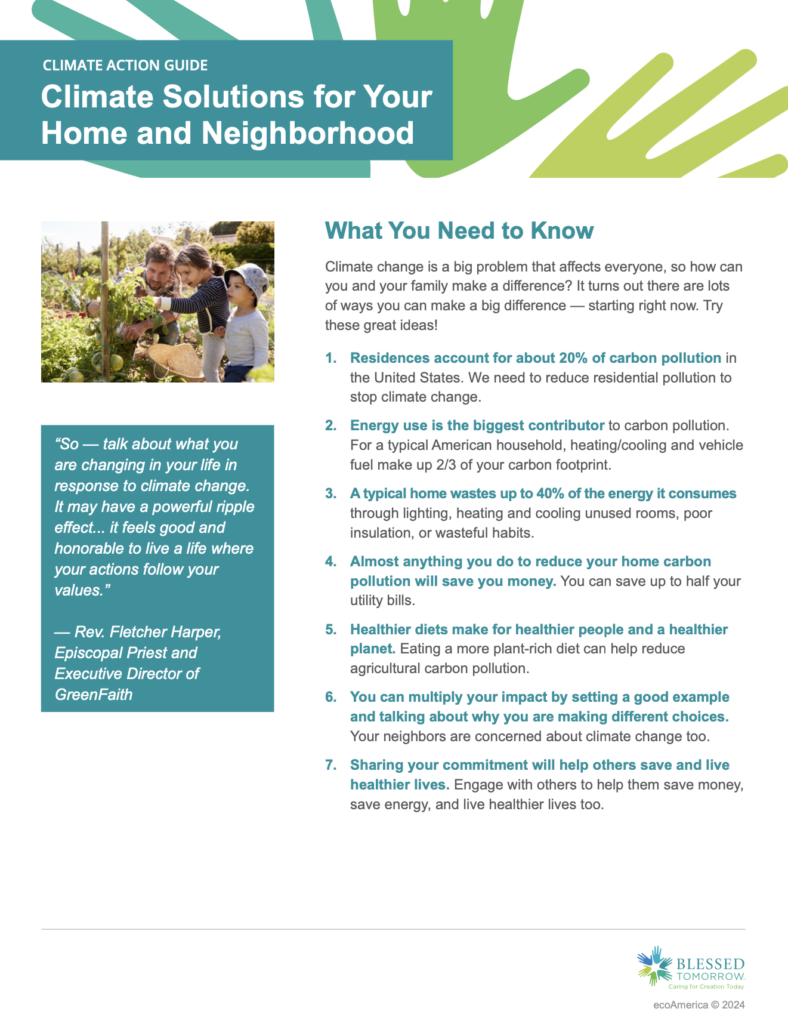Climate Solutions for Your Home and Neighborhood
What You Need To Know
Climate change is a big problem that affects everyone, so how can you and your family make a difference? It turns out there are lots of ways you can make a big difference — starting right now. Try these great ideas!
- Residences account for about 20% of carbon pollution in the United States. We need to reduce residential pollution to stop climate change.
- Energy use is the biggest contributor to carbon pollution. For a typical American household, heating/cooling and vehicle fuel make up 2/3 of your carbon footprint.
- A typical home wastes up to 40% of the energy it consumes through lighting, heating and cooling unused rooms, poor insulation, or wasteful habits.
- Almost anything you do to reduce your home carbon pollution will save you money. You can save up to half your utility bills.
- Healthier diets make for healthier people and a healthier planet. Eating a more plant-rich diet can help reduce agricultural carbon pollution.
- You can multiply your impact by setting a good example and talking about why you are making different choices. Your neighbors are concerned about climate change too.
- Sharing your commitment can help others save and live healthier lives. Engage with others to help them save money, save energy, and live healthier lives too.

What You Need To Do
We can all make our home and neighborhood better. The most important thing to do is to get started. Pick one or two actions from the list below and do them now. The rest will follow more easily.
- Save money by saving energy. Adjust your thermostat, turn off those unused lights, insulate doors and windows, wash clothes and dishes in cool water. So many options!
- Travel wisely. Group your trips, travel with family and neighbors. Use public transportation, walk, or bike when you can. If you have a car, think higher MPG, maybe hybrid or electric.
- Eliminate waste wherever you can. Use less and recycle. Go for glass and reusable containers instead of plastic bags and wraps. Take reusable bags to shop. Make sure everyone in your family has a reusable water bottle and takes their own mug to the coffee shop.
- Green your neighborhood. Restore nature and increase property values by planting trees and other native plants to help reduce heat, improve mental health and community well-being, provide better air quality and cleaner water.
- Help others. If your neighborhood has plenty of trees and gardens, seek out vulnerable ones that don’t and could use your help. If your neighbors don’t have the right kind of roof for solar panels, build support for community solar. Partner with other neighbors to make a difference.
- Share your care. Multiply your results. Invite your local newspaper to do a story on your home and neighborhood. Share what you’ve done on your neighborhood listserv or social media, and with your colleagues and worship community. If you rent, encourage your landlord to adopt energy-saving practices in your unit and others.
- Eat healthier. Increase plant-based protein, double up on fruits, vegetables, nuts, and seafood in your diet. If you can, start a garden and grow your own veggies. Eat it all, and compost the scraps. 40% of all food in the United States goes to waste!
Changing our personal habits can be a great example for others and an important way to reduce climate pollution. We’re building a safer and healthier future for our kids and families, helping our neighbors improve their homes and lives, and even increasing property values which increases tax revenues for important services. It doesn’t take much to start good climate habits that can save you time and money.
“So — talk about what you are changing in your life in response to climate change.
It may have a powerful ripple effect… it feels good and honorable to live a life where
your actions follow your values.”
— Rev. Fletcher Harper,
Episcopal Priest and
Executive Director of
GreenFaith

